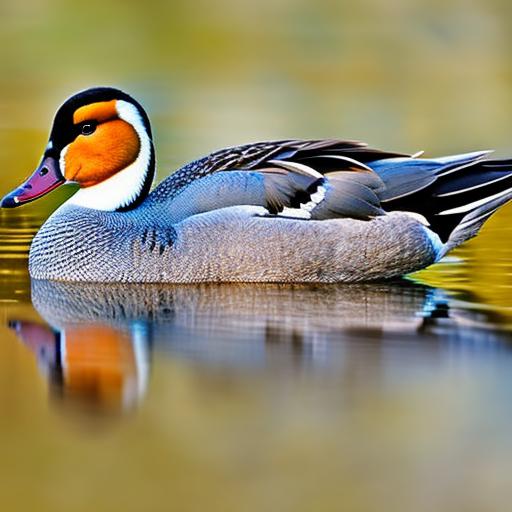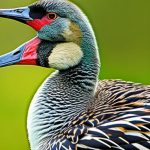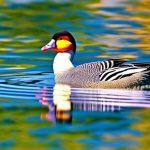Keeping ducks and geese together is a popular practice among poultry enthusiasts. Ducks and geese are both waterfowl species that have similar needs and behaviors, making them compatible companions. They can provide each other with companionship, protection, and even help each other find food. In this article, we will explore the benefits of raising ducks and geese together, how to choose the right breeds for co-habitation, setting up a suitable living environment, providing adequate nutrition and water, maintaining good hygiene practices, handling and training them for co-existence, addressing common health issues, managing reproduction and breeding, and finally, some tips for successful co-habitation.
Key Takeaways
- Keeping ducks and geese together is possible and can be beneficial.
- Choosing compatible breeds is important for successful co-habitation.
- A suitable living environment with adequate nutrition and water is crucial.
- Good hygiene practices and addressing health issues are necessary for their well-being.
- Proper handling and training can help ensure peaceful co-existence.
Benefits of Raising Ducks and Geese Together
One of the main benefits of raising ducks and geese together is that they complement each other’s strengths. Ducks are excellent foragers and can find food in places that geese may not be able to access. Geese, on the other hand, are known for their strong protective instincts and can help keep predators away from the ducks. By keeping them together, you can create a symbiotic relationship where they can rely on each other’s strengths.
Another benefit of keeping ducks and geese together is that they provide companionship for each other. Ducks and geese are social animals that thrive in the company of others. By keeping them together, you are providing them with a flock or herd environment where they can interact with their own kind. This can help reduce stress and improve their overall well-being.
Furthermore, ducks and geese can help each other stay safe from predators. Ducks are more vulnerable to aerial predators such as hawks or eagles, while geese are more adept at defending against ground predators like foxes or raccoons. By keeping them together, they can alert each other to potential dangers and work together to protect the flock.
Choosing the Right Breeds of Ducks and Geese for Co-habitation
When choosing breeds of ducks and geese for co-habitation, there are several factors to consider. First, you need to ensure that the breeds you choose have similar needs and behaviors. This will make it easier for them to coexist and thrive together. For example, both ducks and geese require access to water for bathing and swimming, so it is important to choose breeds that enjoy water activities.
Some compatible breeds of ducks and geese include the Pekin duck and the Embden goose. Both of these breeds are known for their calm and friendly nature, making them suitable companions. Other compatible breeds include the Khaki Campbell duck and the Toulouse goose. These breeds are known for their hardiness and adaptability, making them a good choice for co-habitation.
Setting up a Suitable Living Environment for Ducks and Geese
To ensure the well-being of your ducks and geese, it is important to provide them with a suitable living environment. Both ducks and geese require a secure and spacious housing area where they can roost, nest, and find shelter from the elements. The housing should be well-ventilated, with enough space for all the birds to move around comfortably.
It is also important to provide a separate area for them to access water. Ducks and geese need water for bathing, swimming, and drinking. This can be in the form of a pond, a shallow pool, or even a large tub. Make sure that the water is clean and regularly refreshed to prevent the spread of diseases.
Additionally, ducks and geese need access to grassy areas where they can graze on fresh vegetation. This can be achieved by providing them with a fenced-in yard or allowing them to free-range in a safe area. Just make sure that the area is secure from predators and that there are no toxic plants that could harm them.
Providing Adequate Nutrition and Water for Ducks and Geese
Ducks and geese have specific dietary needs that must be met to ensure their health and well-being. They require a balanced diet that includes a mix of grains, greens, and protein. Commercial poultry feeds formulated specifically for ducks and geese are readily available and can provide the necessary nutrients. You can also supplement their diet with fresh fruits and vegetables, as well as insects or worms.
In addition to a balanced diet, ducks and geese require access to clean water at all times. Water is essential for their digestion, as well as for bathing and swimming. Make sure to provide them with a clean water source that is regularly refreshed. Avoid using water sources that may contain harmful chemicals or contaminants.
Maintaining Good Hygiene Practices for Ducks and Geese

Maintaining good hygiene practices is crucial for the health of your ducks and geese. Cleanliness helps prevent the spread of diseases and parasites, ensuring that your birds stay healthy and happy. Regularly clean their living area, removing any droppings or debris. Provide fresh bedding material such as straw or wood shavings to keep their living space clean and dry.
It is also important to regularly clean their water source to prevent the growth of algae or bacteria. Ducks and geese can be messy drinkers, so make sure to clean their water containers regularly to prevent the buildup of dirt or droppings.
Handling and Training Ducks and Geese for Co-existence
When introducing ducks and geese to each other, it is important to do so gradually and under supervision. Start by allowing them to see each other through a fence or mesh barrier, so they can get used to each other’s presence without direct contact. Once they seem comfortable, you can gradually allow them to interact in a controlled environment.
Training ducks and geese to coexist peacefully can be achieved through positive reinforcement. Reward them with treats or praise when they exhibit calm and friendly behavior towards each other. This will help reinforce the desired behavior and create a harmonious environment.
Addressing Common Health Issues in Ducks and Geese
Ducks and geese are generally hardy birds, but they can still be susceptible to certain health issues. Common health problems in ducks and geese include respiratory infections, parasites, and foot problems. To prevent these issues, make sure to provide a clean and dry living environment, regular veterinary check-ups, and a balanced diet.
If you notice any signs of illness or discomfort in your ducks or geese, it is important to seek veterinary care immediately. Early detection and treatment can help prevent the spread of diseases and ensure a speedy recovery.
Managing Reproduction and Breeding in Ducks and Geese
If you plan on breeding ducks and geese, it is important to have a plan in place to manage their reproduction. Ducks and geese are prolific breeders, so it is important to control their breeding to prevent overcrowding and ensure the well-being of the birds.
To manage breeding, you can separate males and females during the breeding season or use birth control methods such as egg removal or hormone implants. If you do want to hatch eggs, make sure to provide a suitable nesting area for the females and monitor the incubation process closely.
Conclusion and Tips for Successful Co-habitation of Ducks and Geese
In conclusion, keeping ducks and geese together can be a rewarding experience for poultry enthusiasts. They complement each other’s strengths, provide companionship, and help each other stay safe from predators. By choosing the right breeds, setting up a suitable living environment, providing adequate nutrition and water, maintaining good hygiene practices, handling and training them for co-existence, addressing common health issues, and managing reproduction and breeding, you can ensure a successful co-habitation of ducks and geese. Remember to always prioritize the well-being of your birds and seek veterinary care when needed.
If you’re interested in keeping ducks and geese together, you might find this article on Poultry Wizard quite helpful. It provides valuable insights on the topic, including tips on feeding ducks and the incubation period for goose eggs. Check it out here to learn more about successfully raising these delightful waterfowl in harmony.
FAQs
What are the benefits of keeping ducks and geese together?
Keeping ducks and geese together can provide a number of benefits, including increased protection from predators, improved foraging and grazing habits, and enhanced socialization for both species.
What are some important considerations when keeping ducks and geese together?
When keeping ducks and geese together, it is important to ensure that both species have access to adequate food and water sources, as well as appropriate shelter and nesting areas. Additionally, it is important to monitor the birds for signs of aggression or other behavioral issues.
What types of housing are suitable for ducks and geese?
Ducks and geese can be housed in a variety of structures, including coops, sheds, and barns. It is important to ensure that the housing is secure and provides adequate protection from predators, as well as adequate ventilation and lighting.
What should I feed my ducks and geese?
Ducks and geese require a balanced diet that includes a mix of grains, vegetables, and protein sources. Commercially available feeds are available, but it is also possible to create a homemade diet using a variety of ingredients.
What are some common health issues that can affect ducks and geese?
Ducks and geese can be susceptible to a variety of health issues, including respiratory infections, parasitic infestations, and nutritional deficiencies. Regular veterinary checkups and proper nutrition can help prevent many of these issues.
Meet Walter, the feathered-friend fanatic of Florida! Nestled in the sunshine state, Walter struts through life with his feathered companions, clucking his way to happiness. With a coop that’s fancier than a five-star hotel, he’s the Don Juan of the chicken world. When he’s not teaching his hens to do the cha-cha, you’ll find him in a heated debate with his prized rooster, Sir Clucks-a-Lot. Walter’s poultry passion is no yolk; he’s the sunny-side-up guy you never knew you needed in your flock of friends!







